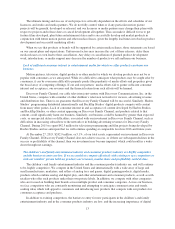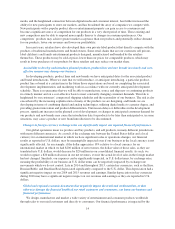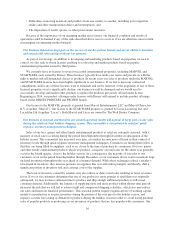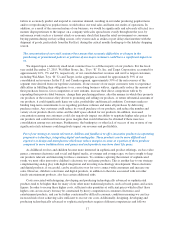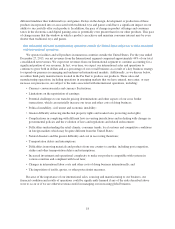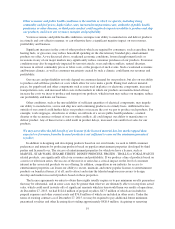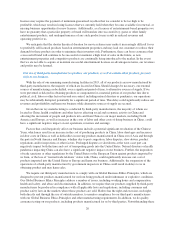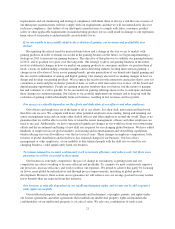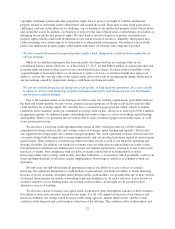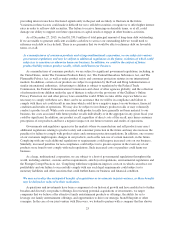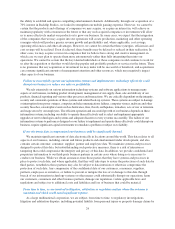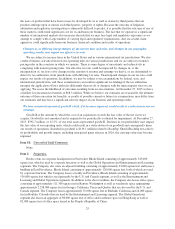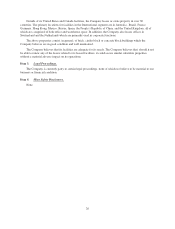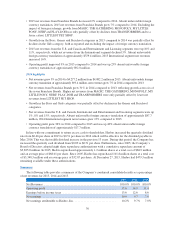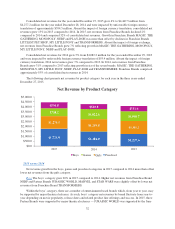Hasbro 2015 Annual Report Download - page 34
Download and view the complete annual report
Please find page 34 of the 2015 Hasbro annual report below. You can navigate through the pages in the report by either clicking on the pages listed below, or by using the keyword search tool below to find specific information within the annual report.prevailing interest rates have fluctuated significantly in the past and are likely to fluctuate in the future.
Variations in these factors could make it difficult for us to sell debt securities or require us to offer higher interest
rates in order to sell new debt securities. The failure to receive financing on desirable terms, or at all, could
damage our ability to support our future operations or capital needs or engage in other business activities.
As of December 27, 2015, we had $1,559.9 million of total principal amount of long-term debt outstanding.
If we are unable to generate sufficient available cash flow to service our outstanding debt we would need to
refinance such debt or face default. There is no guarantee that we would be able to refinance debt on favorable
terms, or at all.
As a manufacturer of consumer products and a large multinational corporation, we are subject to various
government regulations and may be subject to additional regulations in the future, violation of which could
subject us to sanctions or otherwise harm our business. In addition, we could be the subject of future
product liability suits or product recalls, which could harm our business.
As a manufacturer of consumer products, we are subject to significant government regulations, including, in
the United States, under The Consumer Products Safety Act, The Federal Hazardous Substances Act, and The
Flammable Fabrics Act, as well as under product safety and consumer protection statutes in our international
markets. In addition, certain of our products are subject to regulation by the Food and Drug Administration or
similar international authorities. Advertising to children is subject to regulation by the Federal Trade
Commission, the Federal Communications Commission and a host of other agencies globally, and the collection
of information from children under the age of thirteen is subject to the provisions of the Children’s Online
Privacy Protection Act and other privacy laws around the world. While we take all the steps we believe are
necessary to comply with these acts, there can be no assurance that we will be in compliance and failure to
comply with these acts could result in sanctions which could have a negative impact on our business, financial
condition and results of operations. We may also be subject to involuntary product recalls or may voluntarily
conduct a product recall. While costs associated with product recalls have generally not been material to our
business, the costs associated with future product recalls individually or in the aggregate in any given fiscal year
could be significant. In addition, any product recall, regardless of direct costs of the recall, may harm consumer
perceptions of our products and have a negative impact on our future revenues and results of operations.
Governments and regulatory agencies in the markets where we manufacture and sell products may enact
additional regulations relating to product safety and consumer protection in the future and may also increase the
penalties for failure to comply with product safety and consumer protection regulations. In addition, one or more
of our customers might require changes in our products, such as the non-use of certain materials, in the future.
Complying with any such additional regulations or requirements could impose increased costs on our business.
Similarly, increased penalties for non-compliance could subject us to greater expense in the event any of our
products were found to not comply with such regulations. Such increased costs or penalties could harm our
business.
As a large, multinational corporation, we are subject to a host of governmental regulations throughout the
world, including antitrust, customs and tax requirements, anti-boycott regulations, environmental regulations and
the Foreign Corrupt Practices Act. Complying with these regulations imposes costs on us which can reduce our
profitability and our failure to successfully comply with any such legal requirements could subject us to
monetary liabilities and other sanctions that could further harm our business and financial condition.
We may not realize the anticipated benefits of acquisitions or investments in joint ventures, or those benefits
may be delayed or reduced in their realization.
Acquisitions and investments have been a component of our historical growth and have enabled us to further
broaden and diversify our product offerings. In reviewing potential acquisitions or investments, we target
companies that we believe offer attractive family entertainment products or offerings, the ability for us to
leverage our family entertainment offerings, and opportunities to drive our strategic brand blueprint or other
synergies. In the case of our joint venture with Discovery, we looked to partner with a company that has shown
23


